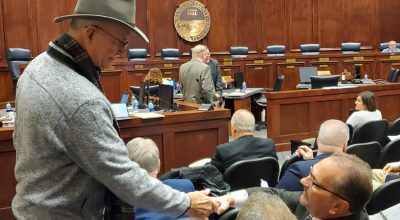
CHATTANOOGA, Tenn., Dec. 27 — A woman beleaguered by criminal charges against her after a notorious and viral traffic arrest was freed from the charges today in Hamilton County criminal court.
By David Tulis / NoogaRadio 92.7 FM
Judge Barry Steelman dismissed the charges against Diana Watt after district attorney Neal Pinkston’s office indicated that the police officer videos did not line up with their written accusations against the caregiver of the elderly.
Mrs. Watt was arrested in July 2018 in an encounter in which a police officers dragged her from her car while her daughter, Jayla, recorded the arrest in a widely publicized video on social media.
“Even when they bound it over, [Officer Brian McClard] didn’t show up to any of these hearings, like I’ve been there — what? — four, at least four or five times and he hasn’t showed up. Once it was in Judge Steelman’s court. He still didn’t show up. He was supposed to show up today, that’s what I was told.But he still didn’t show up. I’ve been going two years, and he only showed up one time. *** I think that’s very malicious.”
Mrs. Watt says she has been unable to find work as a caregiver on account of the criminal case against her, which started off with 8 charges.
Widely esteemed and widely respected sessions court judge Clarence Shattuck treated her with prejudice and partiality by ordering her repeatedly to court after her accuser, Officer McClard failed six times to show up without giving Mrs. Watt notice nor, apparently, the court.
On her seventh appearance in court, the officer appeared, testified against her, and convinced Judge Shattuck to let the case go before the grand jury. It’s not clear whether she had representation or counsel at that hearing.
Mrs. Watt had refused a public defender, though she is poor, because of distrust in that office. But a public defender, Jay Perry, made at least one appearance on her behalf in a sessions court hearing.

Aggravating circumstances
While the statute limitations has run as regards her arrest, one could argue that in the process of malicious prosecution the clock for one year begins Monday.
“He said I have a year from today to file a malicious prosecution suit,” Mrs. Watt said, indicating she’d talked with an attorney in New York about her ordeal.
Mrs. Watts options for redress are limited. Torts of the kind she suffered are not liable for suit after a year. It has been 256 days from arrest in the parking lot of a gas station on Wilcox Boulevard to dismissal.
In theory at least, a tort action alleging malice could be grounded upon the fact that city government has been under transportation administrative notice since Feb. 20, 2018, at which time it was revealed to the city that Tenn Code Ann. § Title 55 and 65, and federal law at USC § Title 49, regulate carriers for hire, and not private users.
Officer McClard and his colleagues acted as if they had statutory authority to stop Mrs. Watt under petense of a vehicle tag that a database indicated did not match the vehicle. It is not clear how the officers had probable cause to run that check on a citizen.
It is not legal to arrest someone without a warrant unless it is for a public offense committed in the officer’s presence. Registration problems, driving without insurance, “driving on revoked” and similar charges are not public offense, court rulings indicate. The officers were required to go and get a warrant before affecting an arrest.
The state’s stipping, freight, hauling, trucking and transportation statute is aimed at parties involved in what is called extraordinary use of the public right of way, that is, for hire, for profit and as part of the streams of commerce under federal law. Transportation administrative notice makes clear that only the THP has authority to enforce traffic regulations are free to act under the tax and safety rules of Title 55.
Mrs. Watt has said in interviews she was not involved in the field of transportation when she was arrested.
Her arrest occurred after the city had been put on awares about the limits in the statute, so her arrest in disregard of the law injects an aggravating circumstance in her abuse because the city and its agents acted knowingly and intentionally and thus with malice to violate her constitutional rights and those under statute in her seizure.
Shattuck drags out case without authority
As I have reported, Judge Shattuck violated Tennessee rules of judicial ethics by showing favor, partiality and benefit to Officer McClard, who acted in contempt of the judge and his office without excuse. Judges are forbidden to show partiality, and to continue the case six times in 2019 — July 26, August 13, August 17, Nov. 5, Nov. 29, Jan. 31, 2020 — is liable for judicial correction.
Judge Shattuck, 83, announced his retirement six days after an unusual meeting I had with him in his office in which I condemned the operation of courts today in which the rights of the people are trod underfoot by lawless police, careless prosecutors and overworked judges serving state efficiency and police custom.

